Church and State
On July 7, the IRS made waves when it reversed its longstanding guidance that churches must avoid partisan speech under the Johnson Amendment of the U.S. tax code.
What does this new IRS guidance mean for political engagement among progressive churches?

ONE DOESN'T NEED Margaret Atwood’s dystopian fiction to see the frightening potential of theocracy. In this issue, writer René Ostberg tells a chilling story of a malign collusion of church and state — in this case, the Irish Catholic Church and the newly formed Irish state of the 1920s. Together, the two institutions acted as morality police, imprisoning women and girls for the “crime” of becoming pregnant out of wedlock — as Ostberg puts it, “for transgressing Catholic Ireland’s moral and class codes.” More than 10,000 Irish women and girls were incarcerated in so-called Magdalene laundries run by Catholic religious orders with state funding, the last of which wasn’t closed until 1996.

RISHI SUNAK'S ASCENSION in October as British prime minister sparked celebration among some as he became the United Kingdom’s first nonwhite and non-Christian leader. Yet, this evolution comes with some awkwardness. The Church of England is an “established” church in which both monarchy and government play official roles. Sunak’s religious identity remains irrelevant for leading Parliament, but his status as a practicing Hindu would seem to impinge on his ability to discern which Anglican priests are best suited for leadership roles within the church hierarchy.
Raising this concern is not an argument that all prime ministers must be Christian — the U.K. rightly has no religious test for the role, as Sunak’s elevation demonstrates. But his ascension reveals a problem with not fully separating church and state. The Church of England now finds itself with a non-Christian in the ecclesial hierarchy. The roles of the monarch and prime minister in church affairs are in modern times more ceremonial than substantive, but Sunak reveals the problem with the entanglement both in principle and in practice.

ALMOST HALF OF Americans believe the United States should be a “Christian nation,” according to a survey this fall, and a significant percentage say that the Bible should have more sway than the will of the people in shaping U.S. laws when the two conflict. The opinions expressed in the October survey by the Pew Research Center break along party lines, with three-quarters of Republicans (and less than half of Democrats) saying the founders intended for the country to be a Christian nation, and 4 in 10 Republicans (compared to 16 percent of Democrats) believing that the Bible, rather than majority rule, should be the source of the nation’s laws. (A similar percentage of Republicans — 39 percent — surveyed by the American Enterprise Institute in 2021 said that political violence may be necessary to “protect America.”) This summer, Republican Rep. Marjorie Taylor Greene declared that “We need to be the party of nationalism, and I’m a Christian, and I say it proudly, we should be Christian nationalists.”
While it may seem that a portion of one of the country’s two main parties has wandered off to never-never land, the survey doesn’t mean the country is heading toward theocracy—yet. Most of the respondents who say the U.S. should be a Christian nation, according to Pew, “are thinking of some definition of the term other than a government-imposed theocracy.” (A small minority, in the words of one respondent, view Christian nationalism as a way “to use the government to impose an extreme, fringe version of Christianity on everyone in the nation, regardless of others’ religious views. They are no different than al-Qaida or the Taliban.”)
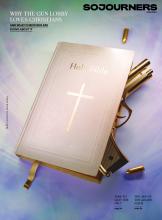
A fringe Christian ideology helped stoke an out-of-control gun culture. People of faith are working to take back the conversation.
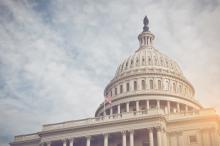
It is noteworthy that congressional chaplains do not demographically represent the American public, and quite strikingly so. Every congressional chaplain since 1789 has been a Christian man, and of those nearly all have been Protestant. Only one, the current Senate chaplain, Rev. Barry Black, has been a person of color. The only time that Muslim and Hindu chaplains have delivered prayers was as one-time guest clergy. It’s the same for women.

Too often, Parker said, teachers have placed Christian crosses and Bible verses on school walls, prayed aloud in classrooms and said things like, “The answer to all your big questions is God.”

Patricia Jannuzzi, the veteran Catholic high school teacher from New Jersey suspended for her anti-gay Facebook posts, will be reinstated immediately, school principal Jean Kline said in a letter.
Jannuzzi, a 33-year theology teacher at Immaculata High School in Sommerville, N.J., was forced to deactivate her Facebook page last month after several alumni started circulating screen shots of her sharply worded posts against gay marriage and gay rights. Two days later, the school placed her on administrative leave.
The letter to students and parents, quoting school director Msgr. Seamus Brennan states in part:
“Immaculata High School has reached an understanding with Mrs. Patricia Jannuzzi. It is the School’s position that a Catholic school teacher must always communicate the faith in a way that is positive and never hurtful. Tone and choice of words matter and I trust Mrs. Jannuzzi’s stated promise to strive always to teach in a spirit of truth and charity.”

A recent survey found that 57 percent of Republicans agreed that Christianity should be established as the United States’ national religion.
Not only would this violate the clear wording of the Constitution and the intention of the founders to keep religion and government separate, it also raises a difficult quandary.
Whose Christianity?
Of the estimated 1,500-plus Christian denominations in the U.S., which flavor of Christianity would emerge as the national standard?
Would it be conservative Christianity or liberal Christianity? Would it be Roman Catholic, Protestant, Orthodox, or nondenominational? Would it be church-centered Christianity or a more personal flavor, such as house communion? Would it be the 1950s-style neighborhood-church Christianity that many older churchgoers yearn for, or a contemporary megachurch?
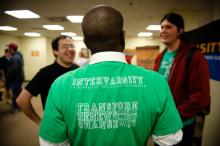
Last week, InterVarsity Christian Fellowship was derecognized at California state schools, barring the group’s access to on-campus meeting rooms, school funds, and other student functions. While InterVarsity welcomes all to participate in its campus-based student groups, it was derecognized because their leadership policy, which requires students in positions of leadership to sign a statement of belief, conflicted with state-mandated nondiscrimination policies.
From the standpoint of religious liberty in this secular age, it’s hard to get around the troubling nature of this policy. Part of me squirms and rolls my eyes at the increasing irony of the intolerance of tolerance. Why can’t we — as a religious community born of a 2,000-year-old tradition — retain some beliefs that have become out-of-style in the modern academy? The principle irks me: Shouldn’t Christian groups be allowed to require that their leaders are Christian?
On the other hand, might this be another example of evangelicalism prioritizing doctrines over compassionate love of the world? I mean, can’t InterVarsity recognize why nondiscrimination policies exist, stop complaining about persecution, welcome their LGBTQ members into leadership, and get on to the real business of redeeming creation to the glory of God? Is this yet another haunting specter of fundamentalism clinging to its evangelical host?
Given that the crux of this issue revolves around what InterVarsity’s student leaders ostensibly do or do not believe, perhaps this is an opportunity for Christians to (re)consider their affinity for “belief statements.” Are they really that important?
Now, wait — before you throw your hands up and shout “liberal postmodern relativism,” let me explain.
Drawing on sociologist Pierre Bourdieu, Christian philosopher James K.A. Smith writes in Imagining the Kingdom that belief is not primarily “assent to propositions but rather a functional, enacted trust and entrustment to a context and a world.”
In other words, it is not primarily our intellectual assent to a correct doctrine that constitutes belief. To our enlightened modern minds, this may sound frightening. What we think doesn’t matter? Aren’t propositional belief statements the very bulwark which has preserved Christian orthodoxy against centuries of secular onslaught?
But consider: what does it really mean to believe in something?

If some secular organizations had their way, much of the current class of lawmakers would flunk out of Congress.
The Secular Coalition for America, an umbrella organization of 13 nontheistic groups including American Atheists and The Freedom From Religion Foundation, issued a “report card” on members of the U.S.House of Representatives and Senate based on their votes on recent legislation involving church-state issues.
More than half of lawmakers received F’s, meaning, in the coalition’s eyes, they fail at upholding the separation of church and state.
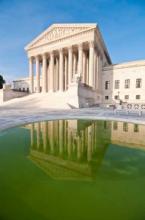
WASHINGTON — In a case that could determine restrictions on expressions of faith in the public square, the Supreme Court on Wednesday will consider religious prayers that convene government meetings.
At issue in Greece v. Galloway is whether such invocations pass constitutional muster, even when government officials are not purposefully proselytizing or discriminating.
Can a town council, for example, open its meetings with prayers invoking Jesus Christ, as happened repeatedly in the town of Greece, N.Y.?
“There’s a whole lot at stake here,” said Ira Lupu, a law professor at George Washington University who specializes in the First Amendment’s religion clauses.
“This case is about first principles: whether the government of a town, acting through its town board, can advance a particular brand of Christianity or any other faith,” said Lupu.
On the other side of the question, Jeff Mateer of the Texas-based Liberty Institute invokes free speech rights and hopes the court will reason that government has no business parsing the words of those who wish to pray in a public forum.

Air Force Academy cadets will no longer be required to include the words “so help me God” when taking their annual Honor Oath.
On Friday officials at the Colorado Springs, Colo., campus announced its 4,000 current cadets would be allowed to opt out of the final phrase of their honor code, which they reaffirm each of their four years of study and training.
“Here at the Academy, we work to build a culture of dignity and respect, and that respect includes the ability of our cadets, Airmen and civilian Airmen to freely practice and exercise their religious preference — or not,” said Lt. Gen. Michelle Johnson, the academy’s superintendent, in a statement.
“So in the spirit of respect, cadets may or may not choose to finish the Honor Oath with ‘So help me God.’”
The current oath reads: “We will not lie, steal or cheat, nor tolerate among us anyone who does. Furthermore, I resolve to do my duty and to live honorably, so help me God.”
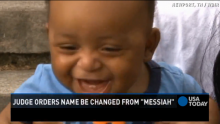
A Tennessee judge should not have barred a couple from naming their child “Messiah,” said the executive director of the American Civil Liberties Union of Tennessee.
On Thursday, the parents of the child appeared in Cocke County Chancery Court in Tennessee because they could not agree on a last name.
Child Support Magistrate Lu Ann Ballew ordered the mother, Jaleesa Martin, to change her son’s name to “Martin DeShawn McCullough.” It includes both parents’ last names but leaves out “Messiah.”
“The word Messiah is a title and it’s a title that has only been earned by one person and that one person is Jesus Christ,” Ballew told the 7-month-old’s parents.

WASHINGTON — What’s one way to ensure that a new Hebrew-immersion public charter school isn’t a Jewish school? Hire a priest to run it.
Sela, which means “rock” or “foundation” in Hebrew, opens in Washington, D.C., on Aug. 19. As a public school, Sela may not teach or show preference to any religion. But the intimate connection between Hebrew and Judaism makes some people wonder whether the separation is truly possible.
The question is not just for Sela, but for the dozen or so other public Hebrew charter schools from Brooklyn, N.Y., to San Diego that have started since the first one opened in Florida in 2007. And more Hebrew language charters are in the design stage.
Making things even more complicated is Hebrew’s ties not only to Judaism but to Israel. When the Sela staff began naming classrooms for major cities in Israel this summer, the school’s executive director, Jason Lody, said there would be no class named after the disputed capital of Jerusalem.
“We want to be a public school of excellence,” Lody said. “We don’t want to be sidetracked by political conversations that don’t focus on getting our 4-year-olds ready for kindergarten.”
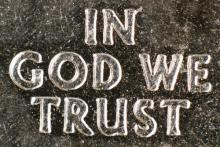
If asked, “what is the most challenging Sunday to preach a sermon?” I suspect few pastors would say July 4th weekend. But as leaders providing spiritual guidance in a country that is often associated with strong nationalistic tendencies, offering a word that speaks to the messy relationship between “God and Country” is a task that American pastors cannot take lightly.
This dilemma of competing loyalties is not new. In both Matthew and Mark, Jesus is approached by opponents who sought to trap him by asking whether they were obligated to pay Roman taxes (Matthew 22:15-22; Mark 12:13-17). An affirmative response would have been a betrayal of faith but a negative answer would be perceived as an act of sedition. Faced with this paradox, Jesus wowed his inquisitors by telling them to give Caesar what was due to Caesar and God what was due to God. Yet, as Franklin Gamwell, notes in Politics as a Christian Vocation, this only raises the question of what belongs to each of the competing authorities. If Christians are called to love God with all our being, then how can anything not belong to God? How can any other authority make a claim of allegiance on our lives?
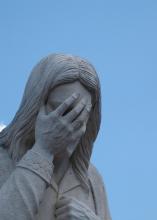
In response to my last article, “ 10 Things You Can't Do While Following Jesus,” I was accused multiple times of being political. All I was trying to do was follow Jesus. So, I thought it'd be interesting (and generate tons more hate mail) to show what a list would actually look like if I were being political intentionally. Like the first list, this is not a complete list, but it's a pretty good place to start.
There will be those who comment and send me messages berating me for “making Jesus political.” It's OK. Fire away. Jesus didn't worry much about stepping on political toes, and the Bible insists that governments be just toward the least of these (the books of the prophets alone make this point very clear). Frequently, people who are the most vocal about not making Jesus political are the same people who want prayer in school and laws based on their own religious perspectives. By a happy little circumstance that brings us to my list:
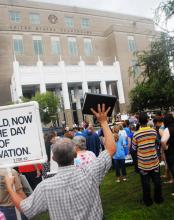
The Puritans sailed to these shores 400 years ago seeking freedom of religion, but freedom of their religion only. Earlier this year, a group of North Carolina lawmakers, apparently channeling the Puritans, tried to establish Christianity as the state religion.
Their action was prompted by a complaint filed by the American Civil Liberties Union. The ACLU noted that some county commissions and other governmental boards around the state opened meetings with prayer. While these various boards had policies that allowed for a multiplicity of religious voices, most prayers were offered in the name of Jesus Christ.
Eleven legislators, all white male Christians, backed a bill to codify Christianity in state law, saying the First Amendment to the U.S. Constitution does not trump the state’s rights. The effort died a quick and merciful death.
These misguided politicians forgot a simple truth – even if a state could mandate a public religion, that wouldn’t change what is in people’s hearts. As Roger Williams wrote in June 1670, “Forced worship stinks in God’s nostrils.” Williams, who was expelled by the Puritans and founded a religious colony in Rhode Island, knew firsthand the importance of religious freedom.
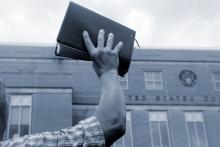
The Supreme Court agreed Monday to consider whether prayers can be offered at government meetings — a practice that’s been common in Congress and throughout the states for more than two centuries.
The religious expression case, which comes to the court from the town of Greece, N.Y., focuses on the first 10 words of the First Amendment, ratified in 1791: “Congress shall make no law respecting an establishment of religion.”
That Establishment Clause was violated, the 2nd U.S. Circuit Court of Appeals ruled last year, when the Greece Town Board repeatedly used Christian clergy to conduct prayers at the start of its public meetings. The decision created a rift with other appeals courts that have upheld prayer at public meetings, prompting the justices to step in.
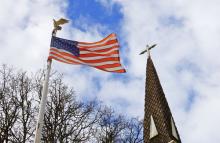
At issue was a new $100 “annual registration fee” that the city imposed on churches and nonprofits. Most of the fee will go toward building safety and fire inspections, and $25 toward administration costs.
But East St. Louis pastors say Mayor Alvin Parks is playing a game of semantics, using the word “fee” where “tax” is more accurate.
They say they only learned about the new fee when they began receiving letters from the city, warning that the churches would be turned over to a collection agency if they didn’t pay. Nonpayment, the letter said, “may reflect negatively on your credit record, lien on property and other remedies that the State of Illinois allows.”
Those building new churches pay fees for licenses and permits, just like anyone else putting up a new structure. But churches and nonprofits don’t pay taxes.